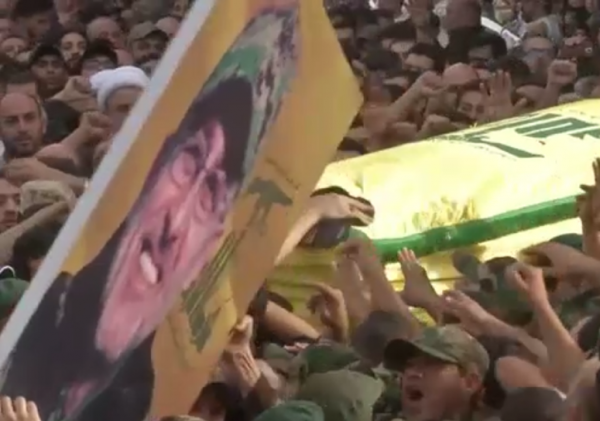By David L. Phillips

Hassan Ammar/AP
Lebanon faces a political crisis. Its presidency, elected by parliament, has been vacant for 23 months. Parliament has convened 39 times over the past two years, but it has failed to elect a president due to lack of a quorum.
Absent a president and a functioning parliament, Lebanon is in a downward spiral. It is struggling to assist the more than 1 million refugees from Syria. The central and municipal governments cannot provide basic services. Garbage is piling up on the streets. Socioeconomic conditions are worsening.
Having just returned from Beirut, I’ve seen the consequences of Lebanon as a fragile state, under the influence of Iran with Hezbollah acting as its proxy.
Parliament is hopelessly deadlocked between the “March 8 Alliance,” including Hezbollah and the Free Patriotic Movement, led by Michel Aoun, and the “March 14 Alliance,” a coalition of political parties including Saad Hariri, the son of assassinated Prime Minister Rafik Hariri.
These political groups are militias, masquerading as political parties. Hezbollah’s Hassan Nasrallah is a warlord, not a politician. And while parliamentary elections are scheduled for summer 2017, Lebanon’s 1960 electoral law is outdated and needs upgrading. Plus, elections could be postponed, which would deepen the political crisis.
Lebanon’s problems can be fixed. After all, Lebanon is pluralistic, but it is not an inherently divided society. Lebanese are unified by a common language (Arabic), a common ethnicity (mostly Arabs and some Armenians) and common values in support of freedom, equality and civil rights.
Lebanon is also rich in human resources. Its people are highly educated and skilled in industries such as banking, construction and textiles. Lebanon also has a beautiful coastline, bountiful agro-industries, and great potential for tourism.
The United States could enhance the country’s independence by working with Russia to mitigate external influences. It could also promote good governance by encouraging Lebanon’s political factions to implement the Taif Agreement, which established a power-sharing formula ending Lebanon’s civil war in 1989.
After all, the United States has an interest in stabilizing Lebanon. Although Lebanon borders Syria, it has managed to withstand pressures from ISIS. But Lebanon is at a fork in the road. It can continue as a bulwark against extremism, or become a failed and fragmented state, exploited by extremists.
Of course, Lebanon’s challenges do not occur in a vacuum; they are part of a broader sectarian conflict in the region. Iran and Saudi Arabia, for example, project their rivalry for regional influence in countries such as Lebanon.
But ultimate responsibility rests with the Lebanese themselves.
To move forward, progress could occur in steps, starting with the election of an interim president who would serve for 12 months. The interim president would oversee the drafting of a new electoral law, and parliamentary elections would occur in summer 2017 (as scheduled), followed by the election of a president for a regular six-year term.
In the past, the Lebanese people wanted the United States to stay out of their internal affairs. But during my meetings in Beirut, senior officials were imploring for more proactive U.S. engagement.
The Obama administration has single-mindedly pursued a nuclear deal with Iran. But while Washington has looked the other way, Iran has projected its power and influence, establishing a Shiite crescent from Tehran to Baghdad, to Damascus and Beirut.
This acquiescing to Iran explains the Obama administration’s tepid response to atrocities by the Iranian-backed Alawite government of Bashar al-Assad in Damascus; Syria is a platform for Iran to project power in the region.
The Obama administration also appears to be tolerating Iran’s influence in Iraq, fueling Sunni concerns. And although the United States lists Hezbollah as a Foreign Terrorist Organization, it has apparently turned a blind eye to Hezbollah’s undermining of democracy in Lebanon and crimes in Syria.
Still, despite America’s accommodation of Hezbollah, the organization may be in decline. It did not perform as well as some expected in last week’s local elections, while the killing of its top commander in Syria, Mustafa Badriddine, is also a significant setback.
Badriddine’s killing is allegedly the work of Sunni insurgents, backed by Saudi Arabia, and comes as the Saudis, in an effort to reaffirm their relevance, have looked to intensify support for Sunnis in Iraq and Syria as well as exert pressure on Lebanon.
Why? Because the Obama administration’s tilt toward Iran makes Saudi Arabia feel abandoned by the United States. And it is that reality that underscores the need for the United States to have a more balanced approach between Iran and Saudi Arabia, while working more closely with Russia to address crises in the region.
The multitude of problems confronting the Middle East are interconnected. While the United States is pursuing a peace deal for Syria, it should not forget Lebanon. Stability there could be a linchpin to progress in the region. It is therefore important for the United States to take a more comprehensive approach to conflict resolution in the region.
CNN

Leave a Reply
You must be logged in to post a comment.